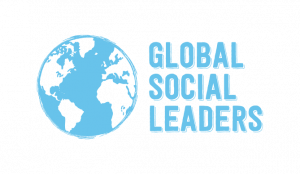This month, in the Global Social Leaders Feel Good Friday bulletin, we were lucky enough to be able to feature a Q&A with The SHiFT Platform.
Launched on World Oceans Day 2020, and developed by eXXpedition co-founder/ocean advocate Emily Penn and global technology leader SAP, the platform scales up support for individuals and businesses to tackle plastic pollution around the world. By navigating hundreds of impactful solutions from sea to source, users can find the ones that are best for them to action.
Global Social Leaders connection with SHiFT stems from their involvement in the GSL Summer Catalyst @Home – a virtual programme funded by Innovate UK that we delivered in during July and August. SHiFT set participants a challenge to do in their own time, which was to try to find their role in solving plastic pollution by using their online platform.
The images to the right have been taken from student Vedika’s submission, which was a presentation that covers ocean pollution and all the solutions available and in use at present.
Click on the buttons below to find out what Emma and Sreya learnt from taking part in SHiFT’s summer challenge.
Is it true that plastic is the oceans biggest polluter?
Every year, 8 million tonnes of plastic enters our ocean. It’s not only one of the biggest causes of ocean pollution, but also one that stems from actions we take every day. There are many other threats to ocean health, from oil spills to untreated wastewater, chemical pollution and ocean acidification. Plastic is so ubiquitous it affects every corner of our ocean, and is something we can work to solve at the individual, industry and governmental level.
What are the effects of pollution on marine life? Can we reverse the damage that has been caused?
There are five trillion tiny plastic pieces and they’re scattered over one of the hardest to reach parts of our planet. They are the same size as algae and plankton, making them not only difficult to clean up, but also easily mistaken as food. Today, scientists have found that 90% of seabird species have consumed plastic, rising to 99.8% by 2050. Last year, a dead whale washed up in the Philippines with 40kg of plastic in its stomach. Discarded fishing nets are also a huge problem – an estimated 640,000 tonnes of ghost nets are left in our ocean each year, many of which end up entangling different species.
Trying to clean up all of this plastic seems like an impossible task. But the positive news is that attitudes are starting to change and if we can take away the pressures of pollution, the ocean will bounce back. For this to happen, we have to turn off the tap and stem plastic production and consumption back on land, at the source.
Can I still help to save the oceans, even though I don’t live near the sea?
The more time we spend at sea, the more we realise that the solutions to ocean plastic are on land. Every bottle and toothbrush polluting the ocean once belonged to someone.
As well as our personal actions, we need to be working as far upstream as we possibly can. The behaviour and actions of you and I as individuals are very important, but we also need to be talking about the role of industry. How can we redesign our products? How can we redesign our systems in society? And, how can we legislate those both to incentivise industry to do it in the first place, and also so that we can sustain positive changes long-term?
To create change, we need to look at our own skill sets and work out how we can apply them to tackling our global problems, like ocean plastic.
What do you do at SHiFT to help make the world’s oceans cleaner?
There’s no silver bullet to solve the problem but there are hundreds of ways to tackle it. A big challenge for many people is knowing where to start. The SHiFT Platform uses innovative technology to help users find their role and use their superpower to tackle ocean plastic pollution. By navigating hundreds of impactful solutions from sea to source, users can find the ones that are best for them to action. The SHiFT Platform was created by ocean advocate Emily Penn.
What can I do to support this cause? Does SHiFT work with schools and young people?
It is billions of micro actions that got us into this situation with ocean plastic, and it is micro actions that will solve the problem. Just get started by taking small steps – it will all add up! Avoid as much single-use plastic as possible, but also take a look at your skill set and work out how you can apply it to the problem. We all have a unique set of skills that can be put to use, you just need to explore where you can make the biggest impact. This might be as a teacher in schools or a sailor at sea, but it also might be as an accountant for a non-profit or as an events organiser, setting up a community clean-up.
Photo Credits
Image 1: Kristen Weiss
Image 2: Sophie Dingwall
Image 3: Sophie Dingwall
Image 4: Sophie Dingwall










